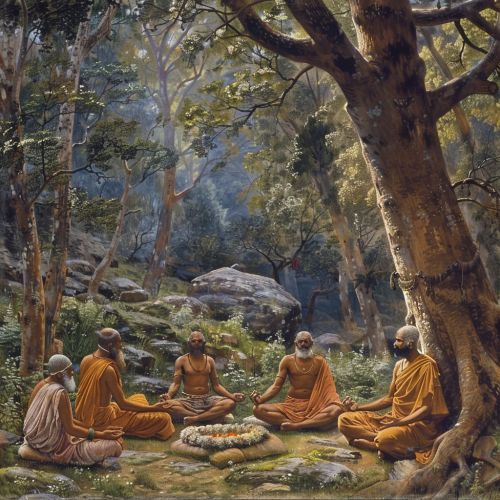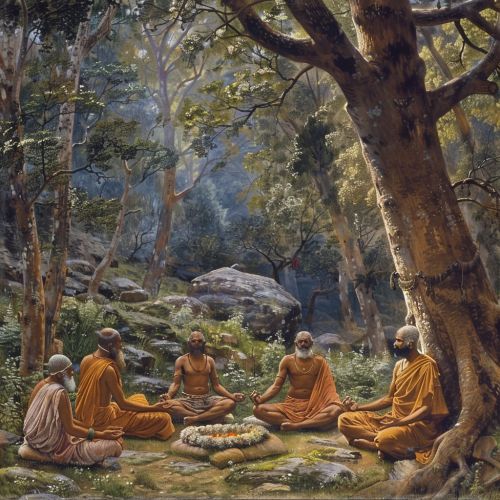Shramanic Traditions
Introduction
Shramanic traditions represent a significant aspect of the religious and philosophical landscape of ancient India. These traditions, which predate and run parallel to Vedic traditions, encompass a variety of spiritual practices and beliefs primarily focused on asceticism, meditation, and the pursuit of spiritual liberation. The term "Shramana" is derived from the Sanskrit root "śram," meaning "to exert oneself" or "to perform austerities." Shramanic traditions include prominent schools such as Jainism, Buddhism, and the Ajivika sect, each contributing uniquely to the spiritual and cultural milieu of the Indian subcontinent.
Historical Context
The origins of Shramanic traditions can be traced back to the late Vedic period, around the 6th century BCE. This era, often referred to as the Second Urbanization, witnessed significant socio-economic changes, including the rise of urban centers, trade, and new forms of social organization. These transformations led to a questioning of the established Vedic orthodoxy and the emergence of alternative spiritual paths.
Shramanic traditions arose as a response to the ritualistic and sacrificial practices of the Vedic religion, emphasizing personal spiritual experience over ritual conformity. The Shramanas sought to attain moksha (liberation) through ascetic practices, ethical conduct, and meditation, challenging the authority of the Brahmin priests and the efficacy of Vedic rituals.
Core Beliefs and Practices
Asceticism
Asceticism is a central tenet of Shramanic traditions. Practitioners, known as Shramanas, often renounced worldly possessions and led austere lives to attain spiritual liberation. This renunciation was seen as a means to overcome desires and attachments, which were believed to be the root causes of suffering.
Meditation
Meditation played a crucial role in Shramanic practices. Techniques varied among different schools, but the primary goal was to achieve mental concentration and insight. In Buddhism, for instance, meditation practices such as Vipassana and Samatha were developed to cultivate mindfulness and tranquility, leading to enlightenment.
Ethical Conduct
Ethical conduct was another cornerstone of Shramanic traditions. Adherents followed strict moral codes, which included principles such as Ahimsa (non-violence), Satya (truthfulness), and Aparigraha (non-possessiveness). These ethical guidelines were seen as essential for purifying the mind and progressing on the spiritual path.
Major Shramanic Traditions
Jainism
Jainism, founded by Mahavira in the 6th century BCE, is one of the oldest Shramanic traditions. Jain philosophy emphasizes non-violence, non-attachment, and the multiplicity of viewpoints (Anekantavada). Jains believe in the existence of an eternal soul (Jiva) that can attain liberation through strict ethical conduct and ascetic practices.
Buddhism
Buddhism, founded by Gautama Buddha in the 5th century BCE, is another prominent Shramanic tradition. The core teachings of Buddhism are encapsulated in the Four Noble Truths and the Eightfold Path. Buddhism rejects the notion of an eternal soul and instead focuses on the concept of Anatta (non-self) and the impermanence of all phenomena.


Ajivika
The Ajivika sect, founded by Makkhali Gosala, was a significant Shramanic tradition during the same period. Ajivikas believed in a deterministic worldview, where all events were predestined and beyond human control. Despite their decline, Ajivikas played a crucial role in the religious and philosophical debates of ancient India.
Influence on Indian Philosophy
Shramanic traditions have had a profound influence on Indian philosophy. Their emphasis on personal spiritual experience, ethical conduct, and meditation has shaped various schools of thought. The concepts of karma, samsara, and moksha, central to Shramanic traditions, have been integrated into Hinduism and continue to influence contemporary spiritual practices.
Decline and Legacy
While Shramanic traditions, particularly Jainism and Buddhism, continue to thrive, others like the Ajivikas have faded into obscurity. However, the legacy of Shramanic traditions endures in the form of their contributions to Indian philosophy, ethics, and spiritual practices. Their challenge to Vedic orthodoxy paved the way for a more diverse and pluralistic religious landscape in India.
